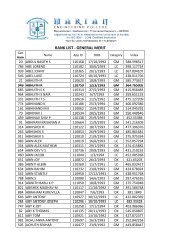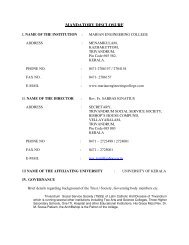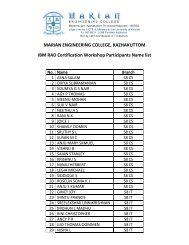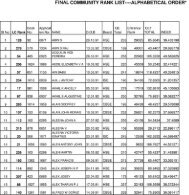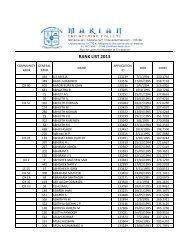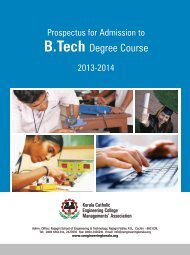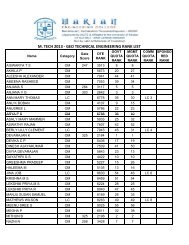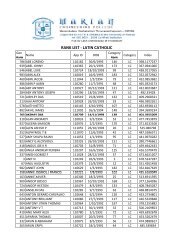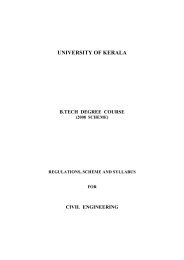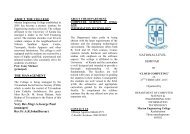UNIVERSITY OF KERALA - Marian Engineering College
UNIVERSITY OF KERALA - Marian Engineering College
UNIVERSITY OF KERALA - Marian Engineering College
Create successful ePaper yourself
Turn your PDF publications into a flip-book with our unique Google optimized e-Paper software.
B.Tech Comp. Sc. & Engg., University of Kerala 56<br />
08.606 DATA COMMUNICATION 2 – 1 – 0<br />
Module I (12 hours)<br />
Communication model- Simplex, half duplex and full duplex transmission.<br />
Time Domain and Frequency Domain concepts - Analog & Digital data and signals - Transmission<br />
Impairments - Attenuation, Delay distortion, Noise - Different types of noise - Channel capacity -<br />
Shannon's Theorem - Transmission media - twisted pair, Coaxial cable, optical fiber, terrestrial<br />
microwave, satellite microwave - synchronous and Asynchronous transmission.<br />
Module II (13 hours)<br />
Sampling theorem - Encoding digital data into digital signal - NRZ, Biphase, Multilevel binary - Encoding<br />
digital data into analog signals - ASK, FSK, PSK - Encoding analog data into digital signals - PCM, PM,<br />
DM - Encoding analog data into analog signals - AM, FM, PM - Multiplexing - TDM, FDM, WDM &<br />
DWDM.<br />
Module III (14 hours)<br />
Error Detecting and correcting codes. Error detection - parity check, CRC, VRC. Forward Error Correction -<br />
Hamming codes, Block codes, Convolution codes. Basic principles of switching - circuit switching, packet<br />
switching, message switching.<br />
Basics of wireless communication- Introduction to WiFi, WiMax, GSM, GPRS<br />
Text Books:<br />
1. Data and Computer Communications, 8 th Edn – William Stallings, PHI<br />
2. Data Communications and Networking, 4 th Ed – Behrouz A Forouzan, Tata McGraw Hill<br />
Reference Books:<br />
1. Computer Networks, 4 th Edn – Andrew S Tanenbaum, PHI<br />
2. Mobile communications, 2 nd Edn – Jochen Schiller, Pearson Education<br />
Internal Continuous Assessment (Maximum Marks-50)<br />
25 Marks - Tests (minimum 2)<br />
15 Marks - Assignments (minimum 3) such as home work, problem solving, literature survey, seminar,<br />
term-project, software exercises, etc.<br />
10 Marks - Regularity in the class<br />
University Examination Pattern<br />
PART A: Short answer questions 10 x 4 marks=40 marks<br />
All questions are compulsory. There should be at least three questions<br />
from each module and not more than four questions from any module.<br />
PART B: Descriptive/Analytical/Problem solving questions 3 x 20 marks=60 marks<br />
Candidates have to answer one question out of two or two questions<br />
out of four from each module.<br />
Maximum Total Marks: 100



